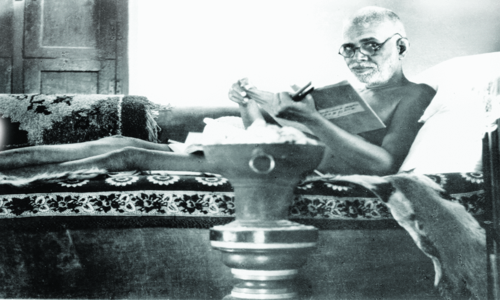The Poetic Compositions of Sri Ramana Maharshi
The major poetic compositions of Sri Ramana Maharshi are:
- Five Hymns on Arunachala – Arunachala Stuti Panchakam in Tamil, comprising of ‘Arunachala Aksharamanamalai’ ‘Arunachala Navamanimalai’ ‘Arunachala Padigam’ ‘Arunachala Ashtakam’ and ‘Arunachala Pancharatnam. While the first four are in Tamil, the fifth one was originally composed by Ramana in Sanskrit and later translated by him into Tamil.
- Upadesa Undiyar in Tamil, translated by Ramana himself into Sanskrit, Telugu and Malayalam as ‘Upadesa Saram’.
- Ulladu Narpadu in Tamil, translated by Ganapati Muni into Sanskrit as ‘Sad-darshanam’ and into Telugu as ‘Unnadi Nalupadi’.
- Miscellaneous songs – ‘Appalam Song’ ‘Song of Self-Knowledge’ ‘On Curing Mother’s Fever’ and stray verses
RAMANA’S FIVE HYMNS ON ARUNACHALA ~ By A.R.Natarajan
The compositions of the enlightened ones are really the words which appear before their mind’s eye. They are spontaneous. It is almost as if crowds of brilliant ideas queue up in their minds hoping that they would be picked up. It is for this reason that ‘Ramana’s five Hymns on Arunachala’ stand apart as outpourings flowing intuitively from the heart. Ramana had no knowledge of Sanskrit, yet he composed the Five Gems on Arunachala (Arunachala Pancharatnam), which is remarkable not only in its power of expression but also for beauty of its language.

It is said that the Enlightened ones alone would be aware of the real meaning of surrender. They are pure channels of the divine and they have no will of their own. To them God’s will is their will. In the ‘Marital Garland of Letters’ all the spiritual moods, their ups and downs and the longing for union with the beloved Lord find expression in verse after verse. To Ramana, Arunachala was his guru. This finds expression in some of the verses in the ‘Marital Garland’. There is a story about how the ‘Marital Garland’ came to be composed. When Ramana was staying in the Virupaksha Cave, a request was made to Ramana by some of his devotees to compose verses on Arunachala which would identify them as Ramana’s devotees. In response to their persistent request the ‘Marital Garland’ with the refrain ‘Arunachala Siva’, ‘Arunachala Siva’ was composed by Ramana during some of his circuits around Arunachala. Referring to this fact, Ramana once humorously remarked “Marital Garland of Letters fed us for many years”.
Each of the ‘Five Hymns on Arunachala’ composed by Ramana has a compelling beauty and a spiritual magnetism of its own. A less noticed hymn is the ‘Necklet of Nine Gems’. True to its name, every one of these verses is a gem indeed. As one reads these verses one cannot but be captivated by the passion which Ramana had for Arunachala. One of these verses is autobiographical. In this verse Ramana reveals a secret; that his very birth was to proclaim the glory of Arunachala for which purpose Arunachala had bestowed on him its own state of steady Self-abidance. There are two special stories about the ‘Decad on Arunachala’ and ‘Eight Verses on Arunachala’ also. One morning, when Ramana was sitting in Virupaksha Cave, the words ‘Karunaiyal Ennai’, ‘having governed me by grace’, came to him very insistently, but he took no special notice of them. When this happened on successive days, Bhagavan composed the first stanza of ‘The Decad on Arunachala’. The next morning the same thing happened with another set of words and he composed the second stanza in a similar manner. This continued every day. The last two stanzas were composed on the same day. On that day, after composing the two last stanzas, Ramana started for giripradakshina. One of his disciples, Aiyaswami, brought a piece of paper and a pencil and told another disciple, ‘Bhagavan has been composing one stanza every morning for some days now. Today he has composed two stanzas. More may come to him. In case they do, have this paper and pencil with you so that the same may be recorded’. And on the way round the hill Bhagavan composed the first six stanzas of Arunachala Ashtakam (Eight Verses on Arunachala). The last two verses of Ashtakam were added later. The first of these spontaneous verses on Arunachala moves one to the core of one’s being. It is a passionate plea to Arunachala to fulfill his job of bestowing Self-knowledge and a reminder to him about his power to make the Heart lotus blossom. In the other spontaneous composition the Eight Verses on Arunachala, we find a most lucid exposition of Ramana’s teachings.
Listen to free audios
Devotionals songs and hymns on the life of Ramana Maharshi

